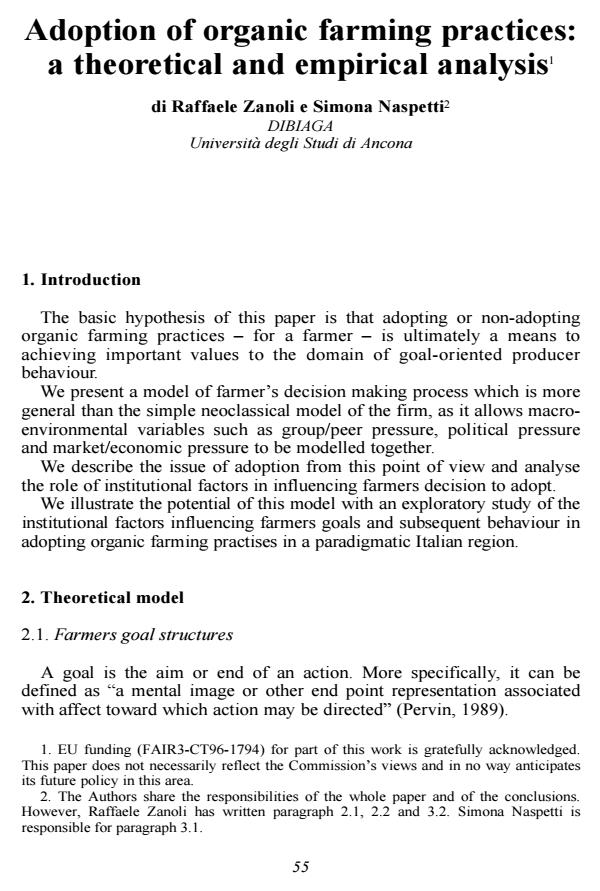Adoption of organic farming practices: a theoretical and empirical analysis
Titolo Rivista ECONOMIA AGRO-ALIMENTARE
Autori/Curatori Simona Naspetti, Raffaele Zanoli
Anno di pubblicazione 2004 Fascicolo 2001/2
Lingua Inglese Numero pagine 16 P. Dimensione file 76 KB
DOI
Il DOI è il codice a barre della proprietà intellettuale: per saperne di più
clicca qui
Qui sotto puoi vedere in anteprima la prima pagina di questo articolo.
Se questo articolo ti interessa, lo puoi acquistare (e scaricare in formato pdf) seguendo le facili indicazioni per acquistare il download credit. Acquista Download Credits per scaricare questo Articolo in formato PDF

FrancoAngeli è membro della Publishers International Linking Association, Inc (PILA), associazione indipendente e non profit per facilitare (attraverso i servizi tecnologici implementati da CrossRef.org) l’accesso degli studiosi ai contenuti digitali nelle pubblicazioni professionali e scientifiche.
Adoption of organic farming practices: a theoretical and empirical analysis (di Raffaele Zanoli, Simona Naspetti) - ABSTRACT: In this paper a theoretical model to analyse and explain the adoption of organic farming techniques at a regional level is presented. Farmers goals and goals structures are used in a means-end analysis of the producer’s behaviour, leading to a representation of the farmer’s decision making process which is more general than the simple neoclassical model of the firm. The relationships among farmer’s motivations and institutional factors acting as incentives and barriers are explicitly taken into account in the analysis, which embeds historical factors as part of the explanation of the process of adoption. As a result, organic farming can be viewed as an institutional adaptation to the absence of certain public goods markets, such as those of clean water, healthy soil, hazard-free food, etc. Organic farming clearly perform a role in internalising the externalities in agricultural production; in this sense it serves as an incentive device. At the same time it also operates as a self-selection device, to identify the characteristics of different individuals. Individuals who believe that they can play a positive role in protecting the environment or, more in general, in shaping the society by their own work, will be more willing to convert to organic farming. An empirical application of the model is used to analyse the adoption process in a paradigmatic Italian region.
Simona Naspetti, Raffaele Zanoli, Adoption of organic farming practices: a theoretical and empirical analysis in "ECONOMIA AGRO-ALIMENTARE" 2/2001, pp , DOI: